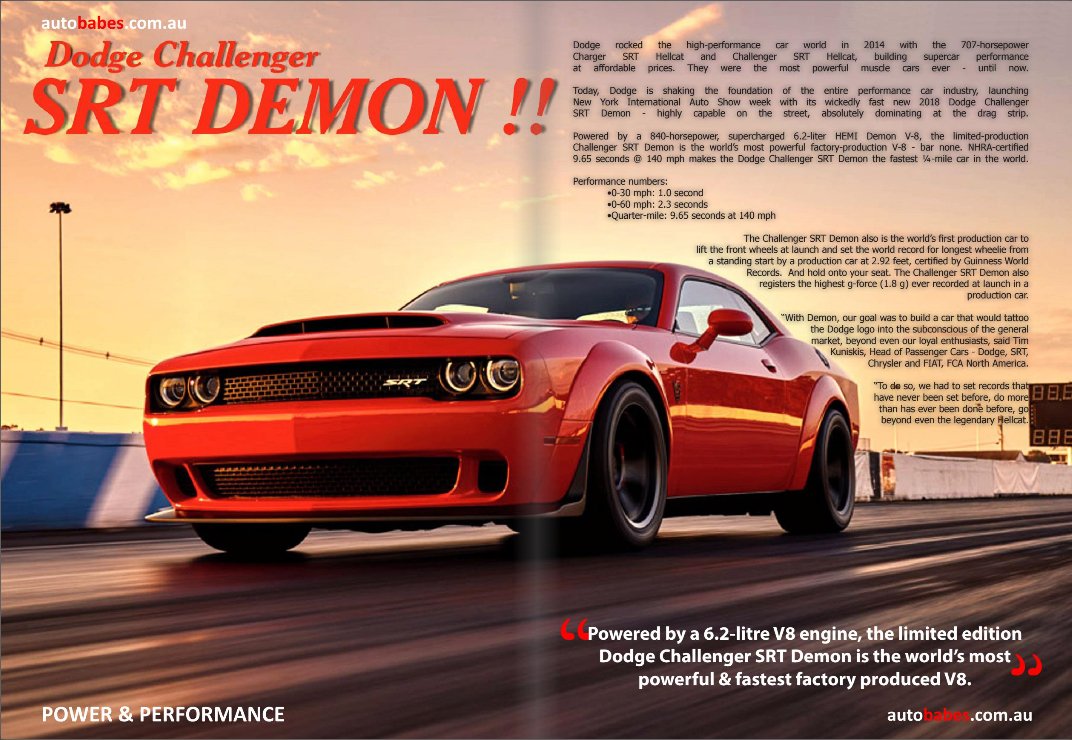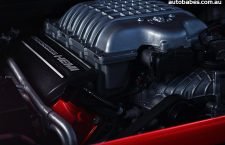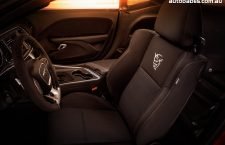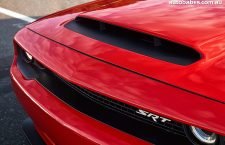
Dodge rocked the high-performance car world in 2014 with the 707-horsepower Charger SRT Hellcat and Challenger SRT Hellcat, building supercar performance at affordable prices. They were the most powerful muscle cars ever – until now.
Today, Dodge is shaking the foundation of the entire performance car industry, launching New York International Auto Show week with its wickedly fast new 2018 Dodge Challenger SRT Demon – highly capable on the street, absolutely dominating at the drag strip.
Powered by a 840-horsepower, supercharged 6.2-liter HEMI Demon V-8, the limited-production Challenger SRT Demon is the world’s most powerful factory-production V-8 – bar none. NHRA-certified 9.65 seconds @ 140 mph makes the Dodge Challenger SRT Demon the fastest ¼-mile car in the world.
Performance numbers:
0-30 mph: 1.0 second
0-60 mph: 2.3 seconds
Quarter-mile: 9.65 seconds at 140 mph
The Challenger SRT Demon also is the world’s first production car to lift the front wheels at launch and set the world record for longest wheelie from a standing start by a production car at 2.92 feet, certified by Guinness World Records. And hold onto your seat. The Challenger SRT Demon also registers the highest g-force (1.8 g) ever recorded at launch in a production car.
“With Demon, our goal was to build a car that would tattoo the Dodge logo into the subconscious of the general market, beyond even our loyal enthusiasts, said Tim Kuniskis, Head of Passenger Cars – Dodge, SRT, Chrysler and FIAT, FCA North America.
“To do so, we had to set records that have never been set before, do more than has ever been done before, go beyond even the legendary Hellcat. The result: an 840-horsepower, 9-second muscle car unlike anything that has ever come before it.”
The Challenger SRT Demon’s record-setting performance is the result of collaboration among the Dodge//SRT, Design, Engineering, Powertrain and Manufacturing teams inside FCA US LLC, many of whom are experienced and active drag racers. While the 2018 Dodge Challenger SRT Demon remains a potent street car, every component was scrutinized and optimized for weight, capability and durability on the strip.
The performance records flow from an impressive list of street-legal production car industry firsts.
- That list includes:
Factory-installed wider, Nitto street-legal drag radials for improved grip, 40 percent more launch force compared with SRT Hellcat tires - Available Direct Connection engine controller calibrated for 100+ unleaded high-octane fuel
SRT Power Chiller redirects air conditioning refrigerant to chill the charger air cooler
After-Run Chiller runs the cooling fan and the low-temperature circuit coolant pump after engine shutdown - TransBrake locks the output shaft of the TorqueFlite eight-speed automatic transmission to hold the car before launch, allowing the driver to increase engine rpm for higher torque and quicker response
- Torque Reserve boosts engine air flow and supercharger rpm before launch, delivering wickedly fast acceleration
- Drag Mode suspension tuning maximizes weight transfer to the rear wheels for better traction
- Drag Mode Launch Assist uses wheel speed sensors to watch for driveline-damaging wheel hop at launch and in milliseconds modifies the engine torque to regain full grip and then continues accelerating the car down the track
- Available narrow “front runner” wheels for use at drag strips cuts front-end weight
Wide-body exterior styling, with concealed wheel well attachments house Challenger SRT - Demon’s massively wide 315/40R18 tires
- Front passenger seat and rear seat deleted to reduce weight (can be optioned back for $1 each)
Production of the limited-edition single model year Challenger SRT Demon begins later this summer, with 3,000 vehicles for the United States and 300 vehicles for Canada. Deliveries to Dodge//SRT dealers will begin this fall.
Dodge has named Hagerty as its official insurance provider of the Dodge Challenger SRT Demon – Hagerty is a company for people who love cars and they already protect many of the rarest high performance cars in the world.
The heart of the 2018 Dodge Challenger SRT Demon is the supercharged 6.2-liter HEMI Demon V-8, rated at 840 horsepower and 770 pounds-feet of torque. The red-painted Demon engine has been certified to the SAE J1349 industry standard for its horsepower and torque ratings. The engine also meets all applicable legal emissions regulations.
While the Demon V-8 shares its architecture with the 707-hp 6.2-liter supercharged HEMI Hellcat V-8, it is not simply a Hellcat engine with more boost. The Demon V-8 engine has 25 major component upgrades from the Hellcat engine, including supercharger, pistons, rods, valve train and fuel injection system.
Among the changes, compared with the Hellcat V-8, the Demon’s supercharged V-8 features:
- Larger supercharger: 2.7 liters versus 2.4 liters
- Increased boost pressure: 14.5 psi versus 11.6 psi
- Higher rpm limit: 6,500 rpm versus 6,200 rpm
- Fuel: Two dual-stage fuel pumps versus one
- Larger induction air box with three sources of intake air: Air-Grabber hood, driver-side Air-
- Catcher headlamp and an inlet near the wheel liner
In addition, the HEMI Demon V-8 includes a high-speed valvetrain, strengthened connecting rods and pistons, and improved lubrication system. The upgrades enable the engine to sustain higher output and pressures while meeting FCA US LLC’s stringent durability requirements.
One key to the Challenger SRT Demon’s best-ever power output is air – the supercharged Demon V-8 takes in plenty of it. The SRT Demon’s Air-Grabber hood includes the largest functional hood scoop (45.2 square inches) of any production car.
The Air-Grabber hood is sealed to the air box, which is also fed from the driver-side Air-Catcher headlamp and an inlet near the wheel liner. Combined, those sources give the Demon V-8 an air-flow rate of 1,150 cubic feet per minute, 18 percent greater than the Hellcat V-8 and the largest air induction volume of any production car.
The additional air inlets help reduce the temperature of the intake air by more than 30 degrees Fahrenheit compared with the Hellcat V-8, which improves overall throttle response.
Heat is the enemy of speed at the drag strip, so Dodge//SRT engineers looked for more ways to keep the intake air as close to the optimum temperature as possible.
The innovative SRT Power Chiller is a production car first. It diverts the air-conditioning refrigerant from the SRT Demon’s interior to a chiller unit mounted by the low-temperature circuit coolant pump. Charge air coolant, after being cooled by ambient air passing through a low-temperature radiator at the front of the vehicle, flows through the chiller unit, where it is further cooled. The chilled coolant then flows to the heat exchangers in the supercharger.
Every run down the drag strip generates plenty of heat. The After-Run Chiller, a factory-production car first, helps the SRT Demon get ready for the next run as quickly as possible.
When the engine is shut down, the After-Run Chiller keeps the engine cooling fan and low-temperature circuit coolant pump running to lower the supercharger/charge air cooler temperature, helping the Challenger SRT Demon minimize heat soak effects. The driver can track the supercharger coolant temperature on the 8.4-inch Uconnect touchscreen in the instrument panel, and know in real time when the supercharger is at the optimum temperature for another run.
The impact of the SRT Power Chiller and After-Run Chiller, combined, lowers intake air temperature by up to 45 degrees Fahrenheit.
The Challenger SRT Demon is the first-ever, street-legal factory-production car designed to run on 100+ unleaded high-octane fuel. That fuel is readily available at select gas stations, specialty shops and drag strips.
The keys to unleashing the SRT Demon’s full performance fury are in the Demon Crate: Direct Connection Performance Parts include a new powertrain control module calibrated for the high-octane unleaded fuel and a new switch bank for the center stack that includes a high-octane button.
The SRT Demon leaves the factory with a powertrain control module configured for 91-octane premium unleaded pump gasoline, which delivers top level performance.
The switch to the Direct Connection controller enables the supercharged HEMI engine to extract the maximum power from the knock-resistant fuel at high pressures and optimum spark timing. Drag racers can anticipate improvements in elapsed times (ETs) and trap speeds with the high-octane fuel.
The Challenger SRT Demon is engineered to be able to run on a mix of 100+ octane and premium unleaded fuels without hurting the engine, but the high-octane function won’t activate if the combined fuel octane is too low. A message in the gauge display tells the driver the car will use the premium fuel calibration until the engine is shut off and restarted. How does the car know? The controller monitors the engine’s knock sensors.
There will be plenty of fuel available: the SRT Demon carries dual fuel pumps (versus one pump in the Challenger SRT Hellcat), larger fuel injectors and fuel lines that handle higher pressures.
Similar to the Challenger SRT Hellcat, the SRT Demon comes with two key fobs. The black fob limits engine output to 500 horsepower. The red key fob unlocks the engine’s full output of 808 horsepower and 717 pounds-feet torque. With either key fob, the driver can activate Eco and Valet Modes. Eco Mode revises the transmission shift schedule to include second-gear starts. Valet Mode limits the engine to 4,000 rpm and reduces torque output.
The high-octane unleaded fuel capability with the optional Direct Connection powertrain controller boosts engine output to 840 horsepower and 770 pounds-feet of torque.
Every Dodge Challenger SRT Demon is equipped with the standard TorqueFlite 8HP90 eight-speed automatic transmission. Already a proven and robust gearbox used with the HEMI Hellcat V-8, the transmission gets some significant changes for duty in the Challenger SRT Demon.
Internal changes include an upgraded torque converter that delivers an 18 percent increase in torque multiplication. Also, the stall speed is increased 11 percent and the lockup speed is increased.
The Challenger SRT Demon is the first-ever, factory-production car with TransBrake, which locks the transmission output shaft to hold the car in place before a standing start. This lets the driver increase engine speed up to 2,350 rpm without overpowering the brakes, resulting in quicker power delivery and up to 15 percent more torque at launch.
Driver-oriented step-by-step instructions are displayed on the instrument cluster to guide the driver through the staging process and help them keep their focus on the Christmas Tree.
The TransBrake helps to improve driver reaction time and launch consistency by using the steering wheel paddle shifters as a launch trigger – a paddle launch improves reaction time by 30 percent compared with a foot-brake launch. In addition, the system enables delivery of initial torque to the flywheel as soon as 20 milliseconds after launch.
TransBrake works in conjunction with another SRT Demon first-ever factory-production car feature, Torque Reserve, to deliver increased levels of power and torque at launch.
Torque Reserve becomes active once engine speed passes 950 rpm. It does two things:
- Closes the bypass valve, “prefilling” the supercharger with boost
Manages fuel flow to cylinders and manages spark advance or retard to balance engine rpm and torque
With TransBrake and Torque Reserve active, the SRT Demon has more than 8 psi of boost at launch and up to 120 percent more engine torque than without Torque Reserve. TransBrake also preloads the driveline with torque, leading to full engine torque delivery at the rear wheels 150 milliseconds after the shift paddle is released. That results in faster acceleration at launch, faster 60-foot times and an improvement of more than a tenth of a second in quarter-mile times, which can be an entire car length.
Driveline components have been upgraded to get all that power and torque to the rear wheels, on every run.
Changes include:
- Upgraded prop shaft with a 15 percent increase in torque capacity. The prop shaft uses high-strength steel. Shaft tube thickness increases by 20 percent and the stub shafts are heat treated for enhanced durability
- The rear differential housing has 30 percent more torque capacity. The housing is made from heat-treated A383 aluminum alloy. New material for the gear set has higher fatigue strength, with a deeper case hardening depth and two-step shot-peening manufacturing process to increase compressive residual stress
- The rear half shafts are larger in diameter; use a high-strength, low-alloy steel; and have 41 splines (up from 38), delivering a 20 percent increase in torque capacity. Eight-ball joints handle more torque, while reducing operating temperatures by more than 86 degrees Fahrenheit
SRT engineers went digital to isolate and resolve one of the biggest challenges to clean launches and driveline integrity – wheel hop.
In simple terms, wheel hop happens when tires quickly slip and regain traction at launch, rapidly storing up and releasing energy in the driveline. These high torque spikes can quickly and severely damage driveline components – and up until now, the only solution was to back out of the throttle.
Not with the Challenger SRT Demon. In a first for a factory-production car, the SRT Demon’s Launch Assist uses the wheel speed sensors to watch for signs that the tires are slipping/sticking. If slip is detected, the SRT Demon’s control module momentarily reduces engine torque to maximize traction almost instantly – without the driver having to lift. Launch Assist reduces loads in the driveline from wheel hop by more than 15-20 percent, dramatically reducing component damage.
The Challenger SRT Demon is equipped with a set of four standard Nitto NT05R street-legal, drag-race tires, a first for a factory-production car.
The 315/40R18 tires were specifically designed and developed exclusively for the SRT Demon, with a new compound and specific tire sidewall construction. The drag radials give the SRT Demon a 15-percent larger tire contact patch and more than twice the grip of the Challenger SRT Hellcat.
The sticky drag tires are mounted on lightweight 11×18-inch wheels, with each tire measuring 12.6 inches wide. Putting full-size tires at all four corners gives drag racers an extra set of rear tires when the front tires are replaced with narrow front-runners at the track.
A unique rear knuckle reduces negative camber by 0.5 degrees, “standing up” the tire and increasing the size of the tire contact patch.
The main mission of the 2018 Dodge Challenger SRT Demon is to cover the quarter mile as quickly as possible. To do this, it combines the best of both mechanical and electronic tuning to deliver maximum launch grip while still maintaining precision directional control.
The Bilstein Adaptive Damping shocks have been tuned for drag racing, shifting as much weight as possible on the rear tires at launch for maximum traction. The weight transfer improves rear tire grip by 11 percent.
Mechanically, weight shift in the Challenger SRT Demon is aided by softening up some key suspension components. Those changes, compared with the Challenger SRT Hellcat, include:
Softer springs: 35 percent lower rate front/28 percent lower rate rear
Softer, lighter, hollow sway bars: 75 percent lower rate front/44 percent lower rate rear
When Drag Mode is activated, the front Bilstein shocks are set for firm compression and soft rebound damping, while the rear Bilstein shocks are set for firm compression and firm rebound damping.
That configuration is maintained as long as the car runs at wide open throttle. When the driver backs off the gas pedal, the system switches to firm compression and firm rebound front and rear for improved handling.
Also during Drag Mode, the traction control system is disabled to enable the rear wheels to spin for a burnout, but the electronic stability control system remains engaged to help the driver with straight-line performance.
In pursuit for every tenth of a second, engineers looked to cut as much weight as possible. The result: Equipment removed from the Challenger SRT Demon weighs more than 200 pounds.
How the weight was lost:
- 58 pounds: Removed front passenger seat and belt
- 55 pounds: Removed rear seat, restraints and floor mats
- 24 pounds: Removed 16 audio speakers, amplifier and associated wiring
- 20 pounds: Removed trunk deck cover trim, carpeting, spare tire cover
- 19 pounds: Used smaller, hollow sway bars
- 18 pounds: Removed mastic, body deadeners, insulators and foam
- 16 pounds: Used lightweight all-aluminum four-piston brake caliper and smaller, 360-mm two-piece rotor
- 16 pounds: Switched to lightweight wheels and open-end lug nuts
- 4 pounds: Switched to manual tilt/telescope steering column
- 2 pounds: Removed park sensors and module
Buyers have the option to add back the front passenger seat, rear seats and trunk carpeting kit for $1 each. Other options include the Harman Kardon 19-speaker, 900-watt audio system, power sunroof, heated and ventilated leather front seats with heated steering wheel, painted Satin Black hood, or new painted Satin Black hood, roof and decklid package.
The 2018 Dodge Challenger SRT Demon gives the driver the capability to set up the car for on-road precision, maximum drag strip performance or anything in between.
The nerve center for those personalities is SRT Performance Pages and Drive Modes, displayed on the Uconnect 8.4-inch touchscreen.
Performance Pages arm the driver with real-time data, including a graphic display of engine horsepower and torque with gear changes plotted; supercharger coolant temperature; timers for reaction time, 0-60 miles per hour (mph), 0-100 mph, eighth-mile and quarter-mile elapsed time and vehicle speed; instantaneous and peak longitudinal and lateral g-forces; and gauge readouts for engine oil temperature and pressure, coolant temperature, transmission fluid temperature, intake air temperature, air-fuel ratio; intercooler coolant temperature, boost pressure and battery voltage.
The Drive Modes include the Challenger SRT Demon-exclusive Drag Mode. Drive Mode settings include Auto (Street) Mode, which sets the Bilstein Adaptive Damping Suspension (ADS) for comfortable ride with compliant handling, and Custom Mode, which lets the driver select between Auto and Drag Mode configurations for the transmission, paddle shifters, traction, suspension and steering.
Auto (Street) Mode options:
- Engine output level is set based on which Demon key is in the vehicle
- If red key is present, the power level can be set per customer preference
- Transmission, suspension and steering default to Auto Mode (Street)
- Customers can set suspension and steering preference
- Electronic Stability Control defaults to full on
- Paddle shifters can be turned on or off per customer preference
- Eco mode is available only in Auto Mode
Drag Mode options:
- TorqueFlite eight-speed transmission runs a calibration optimized for acceleration
- Electronic Stability Control is optimized for straight-line acceleration
- Suspension calibration changes to full firm in rear and firm compression/soft rebound in front
- Paddle shifters are turned on
- Steering is set to Drag Mode for high-speed stability
- Cabin cooling diverted to SRT Power Chiller
- Torque converter lockup point is raised in Drag Mode
- TransBrake is available in Drag Mode only
Custom Mode options:
- Nearly every combination of options available in Auto (Street) or Drag can be configured in the Custom Mode. For example, a driver could select the elements of Drag Mode related to engine and transmission performance, but could select Sport Mode for the suspension and steering, providing the on-road driving dynamics of a Challenger SRT Hellcat
When equipped with the Direction Connection Performance Parts powertrain control module, the driver can use 100+ high-octane unleaded fuel in any drive mode.
Drivers can also select line lock, which engages the front brakes to hold the Challenger SRT Demon stationary but leaves the rear wheels free for a burnout to heat up and clean the rear tires. The system will also let the driver perform a controlled rolling burnout. The system engages for up to 400 rear wheel revolutions.
Performance Pages also includes rpm-adjustable launch control and by-individual-gear-adjustable shift light displayed in the instrument cluster. A new data recorder feature lets the Challenger SRT Demon driver build an archive of data to help optimize the car for track and weather conditions, while helping to improve driving techniques.
Eco and Valet Modes are accessed in the Performance Pages. When Valet Mode is activated, engine horsepower is reduced and rpm is limited to 4,000. Also, certain performance features, such as steering wheel paddle shifters and Launch Control, are disabled. The driver can activate and de-activate Valet Mode with a four-digit PIN code they create.
The 2018 Dodge Challenger SRT Demon is the widest Challenger ever and first-ever, factory-production muscle car with wide-body fender flares.
The wide body flares are designed to amplify the Challenger SRT Demon’s menacing stance, while making room for wider tires with concealed attachments. The fender flares, which cover the lightweight 18×11-inch wheels with exclusive, specifically designed Demon-branded 315/40R18 Nitto NT05R drag radial tires front and rear; add 3.5 inches to the Challenger SRT Demon’s overall width. The front side marker lights are styled to flow with the shape of the fender flares.
The entire chassis is e-coated for durability before final assembly.
Additional defining exterior features include the wide Air-Grabber hood scoop – the largest functional hood scoop (45.2 square inches) of any production car – and new Demon logos flanking each fender.
The driver is the focus in the interior of the Challenger SRT Demon, as it is for every model in the Challenger lineup.
Both the front passenger seat and rear seat, along with their corresponding seat belts, are deleted in the standard configuration of the Challenger SRT Demon.
Customers have the option of adding seats into the car, as well as adding leather coverings, when it is ordered. The front seat(s) have the Demon head logo stitched or embossed into the seat back.
Seating configurations:
- Driver seat only, premium cloth covered
- Driver and front passenger seat, premium cloth covered
- Driver and front passenger seat, Laguna leather and Alcantara suede covered
- Driver, front passenger and rear seats, Laguna leather and Alcantara suede covered
- Facing the driver is a flat-bottom SRT Performance steering wheel wrapped in Alcantara with paddle shifters. The SRT white-face gauges include a 200-mph speedometer and flank the
- 7-inch thin-film transistor (TFT) cluster display screen. A custom carbon fiber instrument panel badge with “Demon” script is located on the outboard vent and signifies the build sequence number.
A new four-point harness bar, available through Speedlogix, is available for use at the track. Mounting points for the bar are accessible, making it easy for customers to install without cutting or drilling anything.
Standard cloth seats include Ballistic II inserts with silver embroidered Demon head logo in the seat backs. An optional Laguna Leather Package includes leather covered seats and trim with embossed Demon head logo.
The 2018 Dodge Challenger SRT Demon will be available 14 exterior colors: B5 Blue, Billet Silver, Destroyer Grey, F8 Green, Go Mango, Granite Crystal, Indigo Blue, Maximum Steel, Octane Red, Pitch Black, Plum Crazy, TorRed, White Knuckle and Yellow Jacket.
All exterior colors are available with Satin Black hood, roof and decklid.
The Demon Crate, available to buyers of the Dodge Challenger SRT Demon, contains components that fully unleash the car’s potential at the drag strip and is fully customized with the buyer’s name, VIN and serial number.
The Demon Crate contains:
- Direct Connection Performance Parts
- Performance powertrain control module with high-octane engine calibration
- Replacement switch module containing high-octane button
- Conical performance air filter
- Passenger mirror block-off plate
- Narrow, front-runner drag wheels
- Demon-branded track tools
- Hydraulic floor jack with carrying bag
- Cordless impact wrench with charger
- Torque wrench with extension and socket
- Tire pressure gauge
- Fender cover
- Tool bag
- Foam case that fits into the SRT Demon trunk and securely holds the front runner wheels and track tools
- The Demon Crate is further customized with the buyer’s name, VIN and serial number.
Production of the 2018 Dodge Challenger SRT Demon begins later this year at the Brampton (Ont.) Assembly plant.
The Challenger SRT Demon is covered by FCA US LLC’s factory warranty, including three-year/36,000-mile limited vehicle warranty and five-year/60,000-mile limited powertrain coverage.
Each 2018 Dodge Challenger SRT Demon buyer receives a unique, customized, leather-bound owner’s Track Tech Manual. In addition to standard vehicle information, it covers all the vehicles’ performance enhancements, includes detailed information about the Challenger SRT Demon’s drag-strip optimized performance technologies and pages for logging track runs. The custom information package also includes a copy of the vehicle build sheet.
See Hennessey’s response to the SRT Demon with their own concept, The Exorcist!













Be the first to comment